深圳牛津英语八年级上学期C1-6考点汇编
- 格式:doc
- 大小:141.50 KB
- 文档页数:15
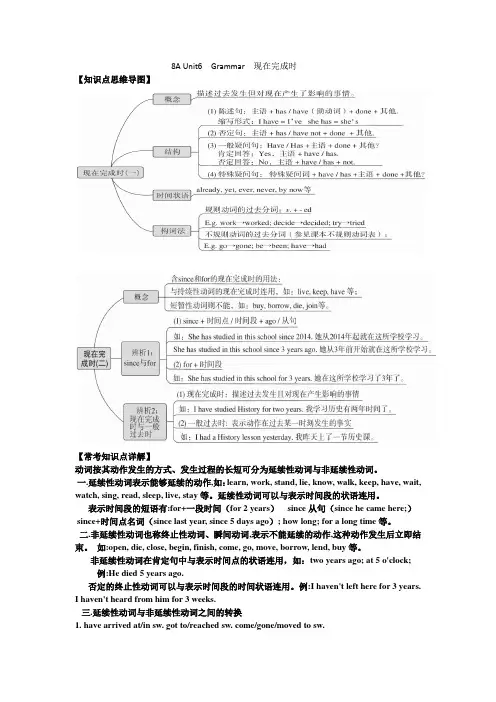
8A Unit6 Grammar 现在完成时【知识点思维导图】【常考知识点详解】动词按其动作发生的方式、发生过程的长短可分为延续性动词与非延续性动词。
一.延续性动词表示能够延续的动作,如:learn, work, stand, lie, know, walk, keep, have, wait, watch, sing, read, sleep, live, stay等。
延续性动词可以与表示时间段的状语连用。
表示时间段的短语有:for+一段时间(for 2 years)since从句(since he came here;) since+时间点名词(since last year, since 5 days ago); how long; for a long time等。
二.非延续性动词也称终止性动词、瞬间动词,表示不能延续的动作,这种动作发生后立即结束。
如:open, die, close, begin, finish, come, go, move, borrow, lend, buy等。
非延续性动词在肯定句中与表示时间点的状语连用,如:two years ago; at 5 o'clock;例:He died 5 years ago.否定的终止性动词可以与表示时间段的时间状语连用。
例:I haven't left here for 3 years.I haven't heard from him for 3 weeks.三.延续性动词与非延续性动词之间的转换1. have arrived at/in sw. got to/reached sw. come/gone/moved to sw.→have been in sw./at…相应的介词2. have come/gone back/returned →have been back3. have come/gone out →have been out4. have become →have been5. have closed / opened→have been close/open6. have got up →have been up;7. have died →have been dead;8. have left sw. →have been away from sw.9. have fallen asleep/got to sleep →have been asleep;10. have finished/ended/completed →have been over;11. have married →have been married;12. have started/begun to do sth. →have done sth. ;13. have begun →have been on14. have borrowed/bought →have kept/had15. have lost →haven't had16. have put on →have worn17. have caught /get a cold →have had a cold;18. have got to know →have known19. have/has gone to →have been in20. have joined/have taken part in the league/the Party/the army21. have borrowed/lent →have kept例:The old man died 4 years ago.---- The old man has been dead for 4 years.---- It is 4 years since the old man died.---- Four years has passed since the old man died.He joined the Party 2 years ago. -----He has been in the Party for 2 years.I bought the book 5 days ago. ---- I have had the book for 5 days.Practice:( )1. When he arrives at the bus stop, the bus ________ for 20 minutes.A. has leftB. had leftC. has been away ( ) 2. I ______ the League for 5 years so far.A. joinedB. have joinedC. have been in ( ) 3. The factory ________ since the February of 1988.A . has been open B. has opened C. was open( ) 4. Mary and Rose _______friends since they met in 2000.A. have madeB. have beenC. have become( ) 5.You mustn't ________ until he comes back.A. be awayB. leaveC. be left( ) 6.The meeting _______ for a week now.A. has finishedB. has endedC. has been over( ) 7.Miss Gao ______ this school for nearly 5 years.A. has been inB. has come toC. has taught( ) 8.Ben ______ a teacher for 4 years .A. has beenB. has becomeC. was( ) 9. I ______ home for a week.A. have returnedB. have been backC. returned( ) 10. How long _______ he ________ ?A. diedB. has, diedC. has, been dead( ) 11. He ______ at eight yesterday afternoon.A. sleptB. was sleepingC. has sleep( ) 12.He ________ the car for a week.A. boughtB. has boughtC. has had( )13.-----How long _____ you _____ ill ? -----Two weeks.A. did fallB. have, fellC. have, been( ) 14.Since 2000, he _____ his hometown.A. has leftB. has moved awayC. has been away from( ) 15.Ill lend you the book , but you can only _____ it for 2 days.A. borrowB. keepC. take( ) 16.The bus ______ on the road for 2 hours so far.A. has stoppedB. stoppedC. has been( ) 17.Are you _____ the jacket these days?A. wearingB. putting onC. dressing( ) 18.He ________ for 2 hours.A. got upB. has got upC. has been up( ) 19. Tom is ill in hospital. He _______ a cold for several days.A. catchesB. has caughtC. has had( ) 20.----- How long can I ______ the book? ------ Two weeks.A. borrowB. getC. keep用since或for填空,完成句子。
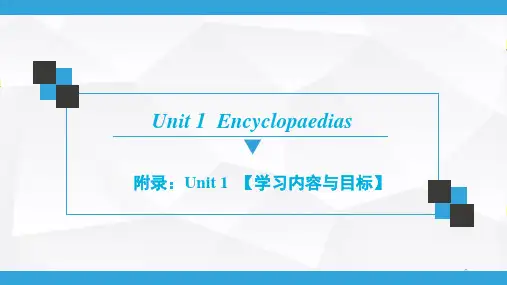
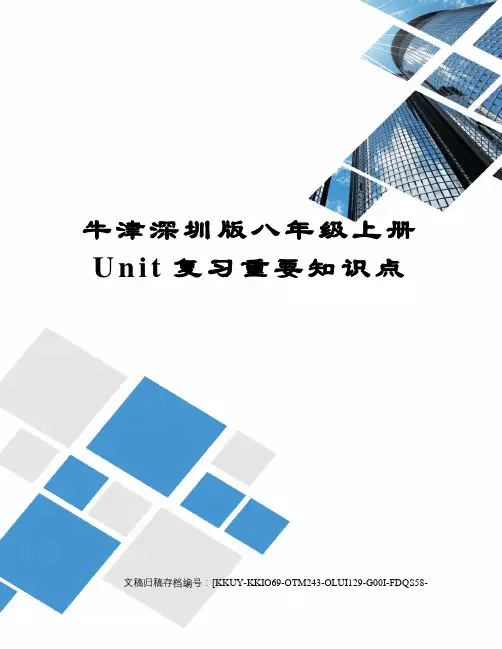
牛津深圳版八年级上册U n i t复习重要知识点文稿归稿存档编号:[KKUY-KKIO69-OTM243-OLUI129-G00I-FDQS58-Unit 5 复习重要知识点单词:educational adj 有关教育的 ----education n ----educate vexchange n 交流 -------- change vculture n 文化 ------- cultural adjtour v 在....旅游 ------ tourist n 游客fantastic adj = very good 极好的experience n. 经验(不可数);经历(可数)(adj.) experienced 经验丰富的introduce v. 使 .......初次了解------ introduction n 引言,介绍success n. 成功 ------successful adj. 成功的------successfully adv. 成功地-----succeed v 成功succeed in doing sth 成功做了某事friend n. 朋友 ------ friendly adj 友好的be friendly to sb “对某人友好“重点词组:1. what do you think of ....认为...怎么样= how do you like .....2. be glad to 高兴做某事例题:The people there are really _____ ________ see you.3. so far 到目前为止;迄今为止4. spend some time/ money...doing sth 花费....做某事▲Eg:I spent 4 weeks touring around Europe.5. place of interest 复数 places of interest 名胜6. a little = a bit of + 不可数名词 a bit +adj7. host family 寄宿家庭8. Why not为什么不Why not do sth = why don’t you do sth?Why not dance = Why don’t you dance?9. introduce ~~~~to 使....初次了解 /把~~~介绍给~~~▲10. as well / too 区别11. keep doing 继续干某事▲12. plan to do sth 计划做某事13. try to do 尽力做某事14. come over to 从~~~过来15. hope to do sth 希望做某事16. take part in 参加17. apply for 申请18. worry about 担心= be worried about19. be proud of = take pride in 为....感到骄傲同义词归纳:1. at first = in the beginning = first of all 开始,首先2. glad = happy = pleased 高兴的3. at the weekend 在周末= Saturday and SundayOn weekdays 在工作日 = from Monday to Friday4. one another = each other 相互5. fantastic = very good = very excellent. 极好的,了不起的6. success = good results 成功7. tour around = travel around 游览现在完成时(一):句型(have/has + 过去分词)1)肯定句:主语+ have / has + 过去分词+ 其他. She has travelled London twice.2)否定句:主语 + have / has + not + 过去分词 + 其他.3)一般疑问句: Have / Has + 主语 + 过去分词 + 其他?★肯定回答: Yes, 主语 + have / has.否定回答: No, 主语+ haven’t / hasn’t.4)特殊疑问句:疑问词 + have / has + 主语 + 过去分词 + 其他?5)一.用适当的时态填空:1. She’s ___________ (live) here ever since she was ten.2. Both of them _____________ (be) in Hongkong for ten days.3. Both of them _____________ (come) to Hongkong ten days ago.4. Half an hour __________ (pass) since the train __________ (leave).5. Mary________ (lose) her pen. _________ you __________ (see) it here and there6. _________ you __________ (find) your watch yet7. ---Are you thirsty ---No I _________ just __________ (have) some orange.8. We __________already __________ (return) the book.9. _________ they __________ (build) a new school in the village?10. I _____________ (not finish) my homework . Can you help me?11. My father __________ (read) the novel twice.12. I _________ (buy) a book just now.13. I _________ (lost ) my watch yesterday.14. My father ___________ (read) this book since yesterday.二.用have/has been to/in, have gone to及go的各种形式填空。
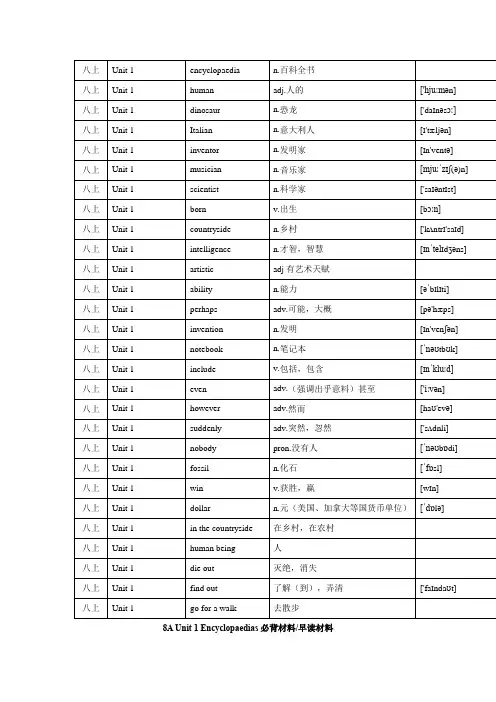
8A Unit 1 Encyclopaedias必背材料/早读材料I词语解释1. a human being = a person 一个人human beings = people人类2.include=have=contain 包含,包括3.no one = nobody 没有人4.perhaps= maybe = possibly= probably 也许5.have the ability to do sth.= be able to do sth. = can do sth.有能力去做6.However= but但是7.go for a walk= have a walk去散步8.more than=over多于9.learn about= know about了解10.huge=very big巨大II重点词组1.在乡村in the countryside = outside the city /far away the city2.了解到,弄清find out = get some information about= learn3.灭绝die out = disappear4.去散步go for a walk5.查阅,查找(它) look (it) up6.出生be born7.长大grow older8.学会做learn to do9.例如for example,10.人类human beings11.一些...另一些... Some...others...12.和...样... as.. as...13.多于;超过more than14.一些重要的事情something important15.从...中了解learn about ...from16.在世界上in the world17.展示聪明才智show great intelligence18.艺术才能artistic ability19.在地球上on Earth / on the earth20.飞行机器flying machines21.从很小的时候from an early age22.6千万年60 million years23.几百万年millions of yearsIII句子1.Da Vinci出生在乡村。
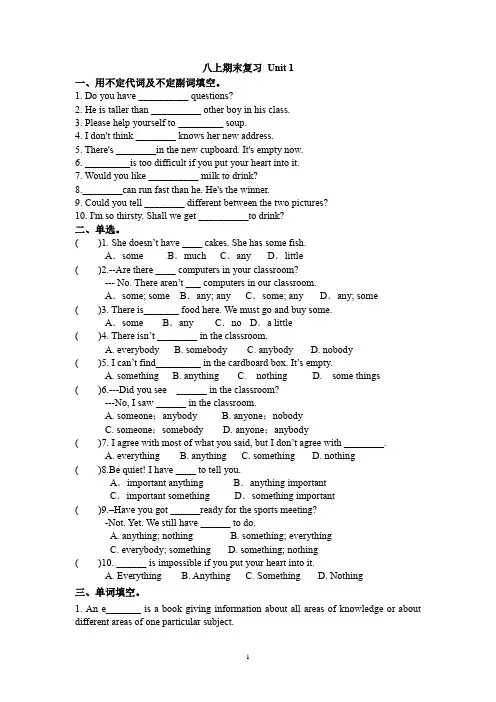
八上期末复习Unit 1一、用不定代词及不定副词填空。
1. Do you have __________ questions?2. He is taller than __________ other boy in his class.3. Please help yourself to _________ soup.4. I don't think ________ knows her new address.5. There's ________in the new cupboard. It's empty now.6. _________is too difficult if you put your heart into it.7. Would you like __________ milk to drink?8.________can run fast than he. He's the winner.9. Could you tell ________ different between the two pictures?10. I'm so thirsty. Shall we get __________to drink?二、单选。
( )1. She doesn’t have ____ cakes. She has some fish.A.some B.much C.any D.little( )2.--Are there ____ computers in your classroom?--- No. There aren’t ___ computers in our classroom.A.some; some B.any; any C.some; any D.any; some( )3. There is_______ food here. We must go and buy some.A.some B.any C.no D.a little( )4. There isn’t ________ in the classroom.A. everybodyB. somebodyC. anybodyD. nobody( )5. I can’t find_________ in the cardboard box. It’s empty.A. somethingB. anythingC. nothingD. some things( )6.---Did you see ______ in the classroom?---No, I saw ______ in the classroom.A. someone;anybodyB. anyone;nobodyC. someone;somebodyD. anyone;anybody( )7. I agree with most of what you said, but I don’t agree with ________.A. everythingB. anythingC. somethingD. nothing( )8.Be quiet! I have ____ to tell you.A.important anything B.anything importantC.important something D.something important( )9.–Have you got ______ready for the sports meeting?-Not. Yet. We still have ______ to do.A. anything; nothingB. something; everythingC. everybody; somethingD. something; nothing( )10. ______ is impossible if you put your heart into it.A. EverythingB. AnythingC. SomethingD. Nothing三、单词填空。
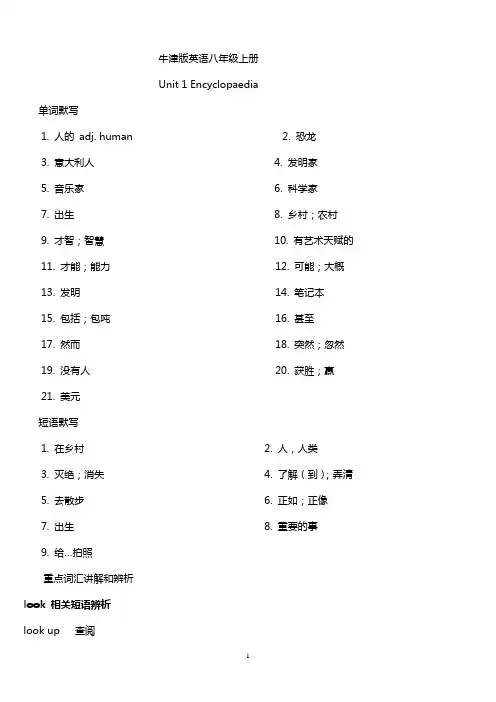
牛津版英语八年级上册Unit 1 Encyclopaedia单词默写1. 人的adj. human2. 恐龙3. 意大利人4. 发明家5. 音乐家6. 科学家7. 出生8. 乡村;农村9. 才智;智慧10. 有艺术天赋的11. 才能;能力12. 可能;大概13. 发明14. 笔记本15. 包括;包吨16. 甚至17. 然而18. 突然;忽然19. 没有人20. 获胜;赢21. 美元短语默写1. 在乡村2. 人,人类3. 灭绝;消失4. 了解(到);弄清5. 去散步6. 正如;正像7. 出生8. 重要的事9. 给…拍照重点词汇讲解和辨析look 相关短语辨析look up 查阅look out 注意;留心look over 检查look after 照顾look at 看着look around 环顾四周look forward to 期待look like 看起来像2. drawing VS. picture VS. paintingdrawing 指素描、工程图、线条图、铅笔画、钢笔画等picture 指图片、图画、照片等。
指照片时,与photo意思相同painting 指着色的水彩画、油画等3. as…as…不…一样本句型属于事物之间的同级比较。
当句子为肯定句时,用“A…as + 形容词/副词+ as B”,表示“A和B…一样”; 当句子为否定句时,用“A…not as/so + 形容词/副词+ as B”,表示“A 不如B…”。
(so…as不用于肯定句)I never went through a final exam that was as difficult as that one.Amanda doesn’t run so/as fast as Annabella.4. millions of VS. 基数词+ millionhundred, thousand, million 等词,不具体数字连用时,后面不加s, 不加of, 直接跟名词复数。
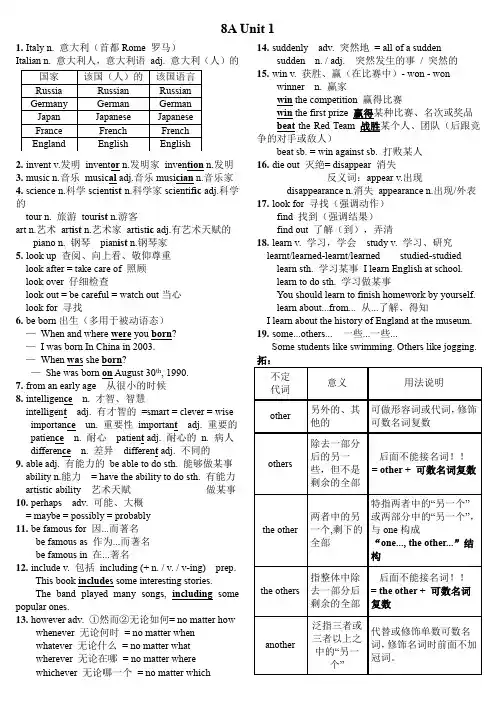
8A Unit 11.Italy n. 意大利(首都Rome 罗马)Italian n. 意大利人,意大利语adj. 意大利(人)的2.invent v.发明invent or n.发明家inven tion n.发明3.music n.音乐music al adj.音乐musi cian n.音乐家4.science n.科学scient ist n.科学家scientif ic adj.科学的tour n. 旅游tour ist n.游客art n.艺术art ist n.艺术家artist ic adj.有艺术天赋的piano n. 钢琴pian ist n.钢琴家5.look up 查阅、向上看、敬仰尊重look after = take care of 照顾look over 仔细检查look out = be careful = watch out当心look for 寻找6.be born出生(多用于被动语态)—When and where were you born?—I was born In China in 2003.—When was she born?—She was born on August 30th, 1990.7.from an early age 从很小的时候8.intelligen ce n. 才智、智慧intelligen t adj. 有才智的=smart = clever = wiseimportan ce un. 重要性importan t adj. 重要的patien ce n. 耐心patien t adj. 耐心的n. 病人differen ce n. 差异differen t adj. 不同的9.able adj. 有能力的be able to do sth. 能够做某事ability n.能力= have the ability to do sth. 有能力artistic ability 艺术天赋做某事10.perhaps adv. 可能、大概= maybe = possibly = probably11.be famous for 因...而著名be famous as 作为...而著名be famous in 在...著名12.include v. 包括including (+ n. / v. / v-ing) prep.This book includes some interesting stories.The band played many songs, including some popular ones.13.however adv. ①然而②无论如何= no matter howwhenever 无论何时= no matter whenwhatever 无论什么= no matter whatwherever 无论在哪= no matter wherewhichever 无论哪一个= no matter which 14.suddenly adv. 突然地= all of a suddensudden n. / adj. 突然发生的事/ 突然的15.win v. 获胜、赢(在比赛中)- won - wonwinner n. 赢家win the competition 赢得比赛win the first prize 赢得某种比赛、名次或奖品beat the Red Team 战胜某个人、团队(后跟竞争的对手或敌人)beat sb. = win against sb. 打败某人16.die out 灭绝= disappear 消失反义词:appear v.出现disappearance n.消失appearance n.出现/外表17.look for 寻找(强调动作)find 找到(强调结果)find out 了解(到),弄清18.learn v. 学习,学会study v. 学习、研究learnt/learned-learnt/learned studied-studiedlearn sth. 学习某事I learn English at school.learn to do sth. 学习做某事You should learn to finish homework by yourself.learn about...from... 从...了解、得知I learn about the history of England at the museum.19.some...others... 一些...一些...Some students like swimming. Others like jogging.20.as...as... 和...一样(中间用adj.或adv.原级)、not as...as... / not so...as... 不如...ed to do sth. 过去常常做某事be used to doing sth. 习惯于做某事use...to do 用...做...语法(1):some/any/no/a lot of/many, much, a little,a few, little,a little1.some ①常用于肯定句,意为“一些、几个”,②修饰可数名词复数和不可数名词,③some用于疑问句时,表示建议、请求或希望对方得到肯定回答。
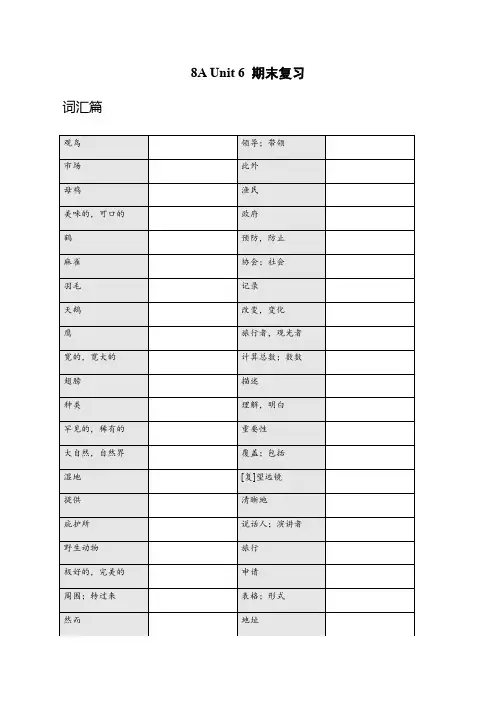
8A Unit 6 期末复习词汇篇短语篇搭配篇1.encourage sb. (not) to do sth.encouragement (n.)2.show sb. sth. = show sth. to sb.on show 展览;表演3.the description of ……的描述describe(v.)4. a type of = a kind of different kinds of all kinds of kind of稍微,有点儿(原级)5.rare - rarely6.in the north-east of China7.provide sb. with sth. = provide sth. for sb.provide for sb.为某人提供生活所需8.all year round = all the year round9.active - activity10.easy - easily11....per cent of(与不可数名词或单数名词连用作主语时,谓语动词用单数;与名词复数连用作主语时,谓语动词用复数)12.in order to in order not to do sth.13.have space for = make space for14.lead to15.enough名前形后16.adj./adv. + enough (for sb.) to do sth.17.prevent ... from doing sth. = stop/keep ... from doing sth.18.record - recorder19.change into变成change...into...把……变成20.tourist physicist pianist artist scientist dentist chemist21.the importance of important (adj.)22.write down23.agree - agreement agree to do sth.同意做某事agree on/about sth.就……达成一致意见,关于……意见一致agree with与……意见一致(后接表示人或意见的词语)agree to sth.同意某事fortable - uncomfortable25.go birdwatching go+v.-ing26.else常用于疑问词或不定代词之后作后置定语else与other27.be interested in = take an interest in interest - interested- interesting28.introduce sb. to sb.introduce oneself introduction (n.)29.nature - natural语法篇动词不定式作目的状语1.动词不定式作目的状语(1)动词不定式作目的状语,主要用来修饰动词,表示某一动作或状态的目的。
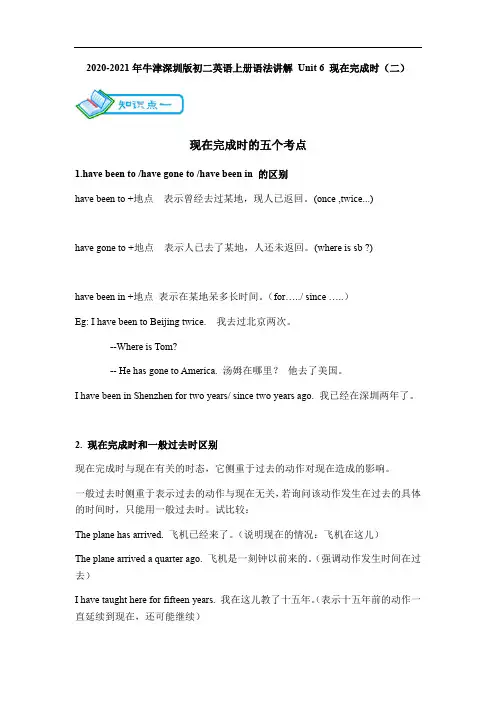
2020-2021年牛津深圳版初二英语上册语法讲解Unit 6 现在完成时(二)现在完成时的五个考点1.have been to /have gone to /have been in 的区别have been to +地点表示曾经去过某地,现人已返回。
(once ,twice...)have gone to +地点表示人已去了某地,人还未返回。
(where is sb ?)have been in +地点表示在某地呆多长时间。
(for…../ since …..)Eg: I have been to Beijing twice. 我去过北京两次。
--Where is Tom?-- He has gone to America. 汤姆在哪里?他去了美国。
I have been in Shenzhen for two years/ since two years ago. 我已经在深圳两年了。
2. 现在完成时和一般过去时区别现在完成时与现在有关的时态,它侧重于过去的动作对现在造成的影响。
一般过去时侧重于表示过去的动作与现在无关,若询问该动作发生在过去的具体的时间时,只能用一般过去时。
试比较:The plane has arrived. 飞机已经来了。
(说明现在的情况:飞机在这儿)The plane arrived a quarter ago. 飞机是一刻钟以前来的。
(强调动作发生时间在过去)I have taught here for fifteen years. 我在这儿教了十五年。
(表示十五年前的动作一直延续到现在,还可能继续)I taught here a year ago. 我一年前在这儿教书。
(表示我现在已经不在这任教了)3.since 和for 区别since + 时间点(过去一个时间点/ 一段时间+ ago/ 从句)for + 时间段,与延续性动词连用。
如:I have worked in Shenzhen since 2007.I have worked in Shenzhen since five years ago.I have lived here since I was ten years old.I have worked in Shenzhen for five years.4. 短暂性动词和延续性动词区别① 短暂性动词:表示不能延续的动作,如:open, die, close, begin, come, go, move,borrow, lend, buy 等① 延续性动词:表示能够延续的动作,如:learn, work, stand, lie, know, walk, keep,have 等短暂动词不能和时间段连用,若与时间段连用,必须将短暂性动词改成延续性动词。
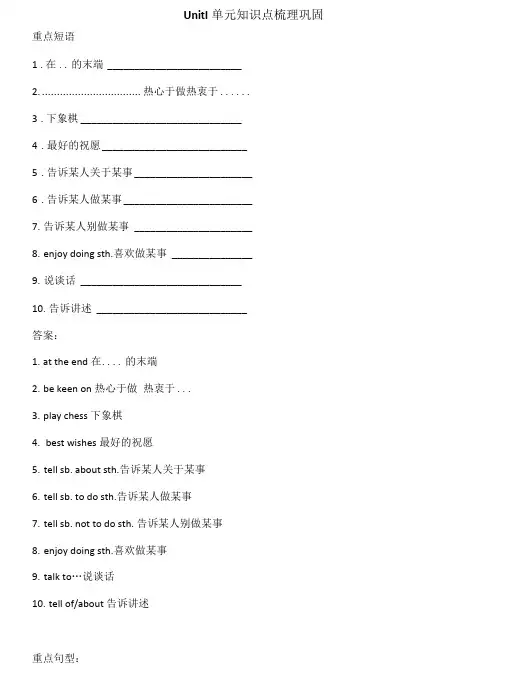
Unitl单元知识点梳理巩固重点短语1.在.. 的末端_________________________2.................................. 热心于做热衷于......3.下象棋______________________________4.最好的祝愿___________________________5.告诉某人关于某事______________________6.告诉某人做某事________________________7.告诉某人别做某事 ______________________8.enjoy doing sth.喜欢做某事 _______________9.说谈话 ______________________________10.告诉讲述 ____________________________答案:1.at the end在.... 的末端2.be keen on热心于做热衷于...3.play chess 下象棋4.best wishes最好的祝愿5.tell sb. about sth.告诉某人关于某事6.tell sb. to do sth.告诉某人做某事7.tell sb. not to do sth.告诉某人别做某事8.enjoy doing sth.喜欢做某事9.talk to…说谈话10.tell of/about 告诉讲述重点句型:1 .动词不定式做表语______________________2.我希望你尽快给我回信_____________________3.希望做某事____________________________4.希望某人做…..…______________________l.s th. +be+ to do动词不定式做表语2.1 hope you will write to me soon .我希望你尽快给我回信3.hope to do希望做某事4.wish sb. to do希望某人做....语法易错点:1、用“by+交通工具"表示交通方式.如:by bike, by bus, by car, by plane , by train , by subway 等.但是,“步行”用on foot,而不是by foot.例句:They go to school by subway every day .他们每天藁地铁去上学.注意:by后面的交通工具名词是单数,而且名词前面不能加任何修饰词.用"take a +交通工具"表示交通方式.如:take a bus, take a train , take a ship,但“骑自行车〃要用ride a bike 来表示. 例句:Mr. Smith often takes a train to work .2.Speak为及物动词,当和.•人说话时,与宾语之间要用一个介词〃to〃连接,其句子结构为Somebody speaks to someone. (Eg. I want to speak to you, please.)Speak也用来形容某人会说哪些语言,此时Speak和语言之间无需任何介词,其句子结构为Somebody speaks + language well. (Eg. Mr. Wang Qiang speaks English very well.) 2. Tell 为及物动词,当作告诉某人某事用,Tell和宾语之间无需任何介词,其句子结构为Somebody tells someone something. (Eg. John tells Mary that he loves her.) 3. Say 为及物动词,但其宾语通常为事情,其句子结构为Somebody says something to someone. (Eg. Jack wants to say something about his family to me.) 4. Talk为及物动词,意思为和某人交谈,其句子结构为Somebody talks with/to somebody about something/somebody. (Eg. Charlie talks to Emma about getting a new car.) at the end (of)在( 的)末端。
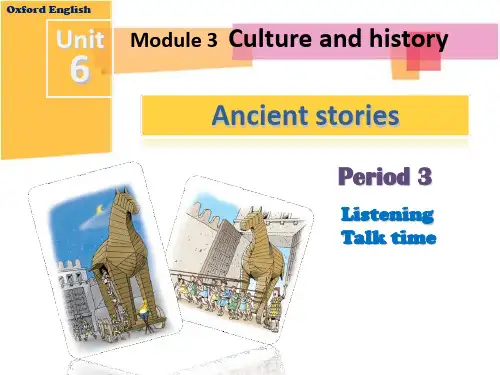
沪教牛津版八年级上册英语知识点总结全册(广州地区)Unit 1 Encyclopedias (4)✧ 单词 (4)✧ 短语 (5)✧ 重点句型 (5)✧ 课文翻译 (5)✧ 知识点解析 (7)✧ 习题 (12)Unit 2 Numbers (16)✧ 单词 (16)✧ 短语 (17)✧ 重点句型 (17)✧ 课文翻译 (17)✧ 知识点解析 (18)✧ 习题 (35)Unit 3 Computers (37)✧ 单词 (37)✧ 短语 (37)✧ 重点句型 (38)✧ 课文翻译 (38)✧ 知识点解析 (39)✧ 习题 (46)Unit4 Inventions (50)✧ 单词 (50)✧ 短语 (51)✧ 重点句型 (51)✧ 课文翻译 (52)✧ 知识点解析 (53)✧ 习题 (56)Unit5 Educational exchange (59)✧ 单词 (59)✧ 短语 (59)✧ 重点句型 (60)✧ 课文翻译 (61)✧ 知识点解析 (62)✧ 习题 (70)Unit 6 Ancient stories (73)✧ 单词 (73)✧ 短语 (74)✧ 重点句型 (74)✧ 课文翻译 (75)✧ 知识点解析 (76)✧ 习题 (81)Unit 7 Memory (86)✧ 单词 (86)✧ 短语 (87)✧ 重点句型 (88)✧ 课文翻译 (88)✧ 知识点解析 (89)✧ 习题 (96)Unit 8 English Week (100)✧ 单词 (100)✧ 短语 (101)✧ 重点句型 (101)✧ 课文翻译 (101)✧ 知识点解析 (103)✧ 习题 (107)每单元必考语法点预览Unit 1 some与any的用法& 复合不定代词somebody, anybody, nobody等的用法Unit 2基数词及数字的表达& 序数词Unit 3形容词的比较级与最高级Unit 4 good, bad, far & (not) as…as…Unit 5现在完成时& already, yet, ever, neverUnit 6 现在完成时中since, for & 现在完成时与一般过去时的区别Unit 7(真实性)条件状语从句& if…not 与unlessUnit 8情态动词should, had betterUnit 1 Encyclopedias 单词✧短语1.in the countryside 在乡村,在农村11.for example 例如2.human being 人12.next to 紧挨着3.die out 灭绝,消失13.look up 查阅4.find out 了解,弄清14.live on Earth 生活在地球上5.go for a walk 去散步15.an Italian painter 一位意大利画家6.be born 出生ed to do sth 过去常常做某事7.more than 多于,超过17.at the end of 在…末尾8.just like 正如,正像18.in the centre 在中心9.how long 多久e out of…从…出来10.would like 想要20.be famous for 以…而闻名✧重点句型1.Some dinosaurs were as small as chickens. 有的恐龙和鸡一样小。
8A Unit1期末复习一、单词、短语1. 在农村__________________2. 人类__________________3. 灭绝__________________4. 找出,发现__________________5. 去散步__________________6. 从早期__________________7.在山里__________________8. 伟大的智力__________________9. 许多__________________ 10. 打开,摔破__________________11. 各种各类的__________________12. 让某人做某事__________________13. 一些重要的事情__________________14. 由…组成__________________15. 变老__________________16. 写一首诗__________________17. 吸引人的景观__________________18. 对某人很重要__________________二、单项选择1. Perhaps we will miss the beginning of the film because of the traffic jam.A. QuiteB. MaybeC. Never2. — Did you watch the football game on TV last night?— Yes, I did. My favourite team won it at last.A. was the best inB. was poor atC. worked hard at3. Nobody in my class is interested in the Chess Club.A. SomeoneB. AnyoneC. No one4. — How long have you learnt English, Li Hong?— For over ten years.A. rather thanB. more thanC. less than5. No human beings can live without water.A. machinesB. plantsC. people6. The little boy has the ability to walk.A. is able toB. is kind toC. is helpful to7. My parents often go for a walk in the park after dinner.A. go on a picnicB. take a walkC. have a rest8. The animals will die out if we don’t think of ways to protect them.A. liveB. growC. disappear9. There are over 3000 students in our school.A.nearlyB.less thanC.more than10. --- The house is big enough to live in.---Yes. It includes five bedrooms and two living rooms.A.takesB.cellectsC. has11. If someone has _________, he or she has the ability to learn, understand and think about things.A. informationB. interestC. intelligence12. When a baby is ________, it comes out of its mother’s body.A. bornB. lostC. saved13. My uncle lives _______ and he works on his farm every day.A. in the seaB. in the countrysideC. in the city14. — What does your father do, Andy?— He is a great ________. He can make music and play the piano very well.A. scientistB. musicianC. inventor15. It was sunny just now, but ______ it began to rain.A. suddenlyB. slowlyC. loudly16. — Have the police arrived at the place of the accident?— Yes. They said they would ________how the accident happened.A. get outB. find outC. look for17. — How long have you collected stamps?— For ten years. _______, I took a great interest in collecting them.A. For a long timeB. From now onC. From an early age18. He is new to our village, so I know _______about him.A.anythingB.everythingC.nothing19. Listen carefully! Miss Li is going to tell us ______.A.interesting somethingB.everything importantC.something important20. There isn’t ___water here. Could you get _____for me?A.any; someB.any; anyC.some; any三、语法填空The Great Fire of London is one of the most famous disasters (灾难) in London’s history. It (1)________(start) at a baker’s (面包店) on September 2nd, 1666. The shop was in Pudding Lane and the (2)_______ (own) was Thomas Farynor who had baked for the king for many years. That day, he forgot to put out (3) _______ fire he used to bake bread. Some fire wood was lit (点燃) and then the fire began.The buildings in London at that time were made of wood and they burnt very (4)_________(easy). In addition, they were very close together, (5)________ the fire spread (蔓延) from one street to another quickly. The blowing of the strong wind also helped the fire spread quickly. There were no firemen or fire engines then, so people tried (6)________ (put) the fire out with buckets of water. Many buildings which the fire destroyed were later built again using bricks(砖) instead of wood.The fire continued (7) _________(burn) for four days. Luckily, only four people were reported to be (8) ________ (die). Samuel Pepys wrote what he saw during the fire in (9)_______ (he) diary. He watched the fire from across the River Thames.(10)________ the fire, a fire service was set up in London to make sure that it didn’t happen again. Astatue was made to remember the Great Fire of London. It still stands in London today.四、连词成句1. they, questions, have, about, do, any, dinosaurs ( ? )________________________________________________________2. born, Shenzhen, he, in, was ( . )________________________________________________________3. can, about, we, from, learn, them, fossils, their (.)________________________________________________________4. dinosuars, as, are, some, as, small, chickens ( . )________________________________________________________5. do, any, we, have, not, bread ( . )________________________________________________________6. will, it, a, help, be, great, studies, with, your ( . )________________________________________________________8. are, sheep, to, farmers, important ( . )________________________________________________________9. useful, have, to, is, an , it, encyclopaedia, an (.)________________________________________________________10. artistic, he, showed, from, an , great, ability, age, early (.)________________________________________________________五、词形变换1. They come from ________ (Italian), maybe they are Italians.2. Thomas Edison was a great _________________ (science).3. The foreigner took out some _______ (dollar) to buy some food.4. Seven people died in the traffic accident, _________ (include) two children.5. Though he was young, he learned ________ (play) chess with his elder sister.6. The man over there ______(be) born in a poor family in 1971.7. Mozart is a famous _________(music)8. Their daughter is very _____________(intelligence).9. _________ (sudden), a fire broke out and the people rushed out of the building quickly.10. They used to ________ (play) table tennis in the gym.11. He can ride as ________(quick) as I can.12. Mike has the _________(able) to get the first prize in Math competition.六、补全对话A: Saly, are you free tomorrow evening?B: (1) __A: Why not go to the movies?B: ______(2)________. I like seeing movies very much.A: ______(3)________B: Well, I like comedies because they are funny. What about you?A: I like them, too. I hear Mr. Bean is on. _____ (4)______.B: Sure. Let’s meet at seven o’clo ck tomorrow evening.A: Oh, it’s a little earlier.B: ______(5)________A: OK. See you tomorrow evening.B: See you.七、作文根据下面的提示写一篇短文介绍马克.吐温。
最新牛津版英语八年级上册知识点总结
(精编版)
本文档总结了最新牛津版英语八年级上册的重要知识点,以帮
助学生复和理解课程内容。
以下是一些主要知识点的概述:
1. 语法知识点
- Simple Present Tense: 描述惯、日常活动和客观事实。
- Present Continuous Tense: 描述正在进行的动作和当前的状态。
- Past Simple Tense: 描述过去发生或完成的动作或状态。
- Present Perfect Tense: 描述经验、对过去发生事情的补充说明。
- Modal Verbs: 表示能力、愿望和建议的动词。
2. 词汇知识点
- 常用动词短语和短语动词的用法。
- 常见的形容词、副词以及它们的用法。
- 重要的名词和名词短语,包括人物、地点和事物等。
- 常用的连词和连接词,用于连接句子和段落。
3. 句型和对话
- 各种常用句型和语法结构的用法。
- 与日常生活相关的对话和交流技巧。
- 谈论个人信息、兴趣爱好、家庭和学校生活的对话。
4. 阅读理解和写作技巧
- 阅读理解技巧,如根据语境猜词义、寻找关键信息等。
- 写作技巧,如写作日记、书信、简短文章等。
- 常见写作句型和表达方式,以及一些写作练。
5. 其他知识点
- 英语语音和发音规则。
- 一些常见的语言交际惯和文化背景知识。
以上只是对知识点的简要总结,建议学生根据自身情况进行针对性的复习。
更详细的知识内容可参考最新牛津版英语八年级上册教材。
祝学习顺利!。
初中英语考点汇编8A审稿人:福永中学李婉佳(红色部分为审稿时新增内容)8A Chapter 1福永中学吴文勇考点1:do sth. a lot / a lot of +可数复数、不可数名词例句:There are a lot of swimmers in the pool. 有许多游泳者在游泳池(L5, P7)试题:She liked bread very much and she ate ______.A. manyB. very muchC. a lot ofD. a lot (D)考点2:a few肯定意义/ few 否定意义,在反义疑问句中注意前否后肯,回答用事实判断法。
例句:There are a few swimmers in the pool. 有一些游泳者在游泳池。
(L5, P7)试题:1. There are few mistakes in your homework, _______?A. do thereB. don’t thereC. are thereD. aren’t there ( C )回答:Yes, there are. I am a little careless. / No, there aren’t. I’ve checked it twice.There are only _______ apples. We should buy some.A. a littleB. littleC. a fewD. few (C)(only a little/few, just a little/few, very little / few )考点3:a little/ little例句:There is a little water in the pool. 有一点水在游泳池(L5, P7)试题:There is very ______water in the bottle.A. a littleB. a fewC. littleD. few ( C )He was thirsty because he drank ______ water.A. a littleB. littleC. fewD. a few (C)考点4:turn off 注意代词it / them 做宾语要中置例句:Turn that tap off. 关闭水龙头(L3, P7)试题:Turn that tap off. (写同义句)Switch that off.Don’t forget to turn off the lights when you go out.Remember to switch off the lights when you go out.----The TV is too loud. Would you please___?A turn it downB turn down itC turn up it D. turn it up (A)When you leave the room, please _____ the light.A. turn onB. turn upC. turn offD. turn down (C)另,sth. be on / off 的用法考点5:感官动词+形容词,区别look happy 与look at sth. happily例句:The voice sounded angry. 声音听起来很生气(L7, P7)试题:---I don’t feel _____. Maybe I’m a little hungry.----The apple looks _____. Do you want to eat?A. good; goodB. good; wellC. well; wellD. well; good (D)考点6:until 肯定句中主句是延续性动词例句:I waited here until you called me. 我一直等知道你叫我(倒数L11, P7)试题:I _______watch TV _________ I finished my homework.A. not…untilB. didn’t…untilC. wasn’t…untilD. /…until (B)否定句的转换I didn’t go to bed until I finished my work. (写同义句)I didn’t go to bed before I finished my work.考点7:freeze—froze –frozen例句:Daisy froze. 她惊呆了(倒数L5, P7)试题:She froze when she saw the car accident.She didn’t move when she saw the car accident.考点8:voice(人的声音), sound(声音), noise(噪音)Say in a low/ loud voice, That sounds good, too much noise/ much too noisy例句:I heard the voices in there.我在那里听到了声音(倒数L4, P7)试题:The girl has a beautiful ________, and she likes singing.A. soundB. voiceC. noiseD. face (B)考点9:clean up=make…clean注意代词it / them 做宾语要中置例句:Then people clean me up. 洗干净(L19, P7)试题:People cleaned the water up in the water treatment works.People made the water clean in the water treatment works.考点10:pollute=make…dirty例句:Remember not to pollute me. 记得不要污染我(倒数L11, P7)试题:Don’t pollute the water.(写同义句)Don’t make the water dirty.8A Chapter 2福永中学吴文勇考点1:suggest例句:Tony suggested Joyce. Tony建议Joyce。
(L3, P17)试题:Joyce suggested that her father ____ to see a film while Tom suggest ____football match.A. went, watchingB. went, to watchC. go, watchingD. go, to watch (C)The doctor suggested that he should do more exercise. (写同义句)The doctor advised him to do more exercise.考点2:take charge of例句:Joyce took charge of the meeting. 负责会议( L6 P17)。
试题:Jim took charge of the company. (写同义句)Jim was in charge of the company.考点3:情态动词, ought to do = should do, 注意其反义疑问句例句:Ought we to discuss it now? 我们应该现在讨论吗?(L7, P21)试题:---Ought we to pay the bill right now?--No, you ___.A. ought notB. ought not toC. ought to not ( C )考点4:talk it over例句:Talk it over among yourselves. 在你们当中展开思考(L14, P17)试题:Let’s talk it over carefully.(写同义句)Let’s discuss it carefully.–Have you decided where to go for your holiday?–No, we need to ______ this weekend.A. talk it overB. talk it overC. vote it forD. elect for it ( A )考点5:不可数名词和可数名词区别例句:Because she has experience. 因为她有经验(L3, P17)试题:She is an _____ teacher because she has lots of _______ in teaching.A. experiencing, experienceB. experienced, experienceC. experiencing, experiencesD. experienced, experiences ( B)考点6:副词例句:We considered the last question briefly .我们简要地考虑最后一个问题(L18, P17)试题:We considered the last question briefly. (写同义句)We thought about the last question in a few words.考点7:decide to do例句:We decided to elect the chief editor. 我们决定选举主编(L2, P17)试题:Jim made a decision to study hard.(写同义句)Jim decided to study hard.考点8:elect elect / choose / vote for sb. to be….例句:We decided to elect the chief editor. 我们决定选举主编(L2, P17)试题:-- Hi why are you so happy? --Because I was _____ to be a chief editor.A .taken B. happened C. named D. elected ( D)考点9:be free to例句:Should it be free to readers?应该对读者免费吗?(L16, P17)试题:The book is free to readers.The readers needn’t pay for the book.考点10:conclude例句:We agreed to conclude the meeting. 我们同意结束会议(倒数L3, P17)试题:We agreed to conclude the meeting.We agreed to finish the meeting.8A Chapter 3沙井中学考点1:动词不定式只能接不定式的动词:want , would like , would prefer , ask ,wish, hope , expect agree ,decide, manage , plan, promise ,choose , encourage, prepare , make up one’s mind ,try one’s best , apply , offer happen ,learn , fail , refuse , afford.注意:个别动词带不定式和动名词有本质区别:如:need , want , require 意为“需要”,主语是物时,用句型:sth. require , want , need + to be done)sth. require , want , need + doing ( 用动词ing 主动形式表被动意义例句:Sally never forgets to do her homework.. (L1, P35)Sally从来不会忘记做她的功课.I hope to study music in France.(L4, P35)我希望在法国学音乐.试题:1. I’m afraid that they would not allow him______ here.A. to smokeB. smokingC. smokesD. smoke2 What’s your plan for the summer holidays?I’ve no idea, but I’ve decided ______ at home and have a good a rest first.A. stayB. to stayC. stayedD. staying3. The little children were told ______ here and there.A. to not drawB. not drawC. not to drawD. not drawKeys: 1A 2. B 3. C考点2:动名词后面+ doing 的动词:practise (练习做…) suggest(建议做…) finish (结束做…) enjoy(享受做…)prefer (偏爱做..) mind (介意做…) deny (否认做…) admit(承认做…)instead of (而不是做…) notice sb. doing(注意到某人做…)go + v-ing (做..)=do some v-ing 固定词组例句:Mr Li enjoys collecting things.(L1,P36)李老师喜欢搜集东西She practices playing the piano every morning.(L2,p36)她每天上午练习弹钢琴.试题:1. Would you mind______ more slowly?Ican’t follow you.A. speakB. spokeC. spokenD. speaking2 Sam enjoys______ stamps. And now he has 226 of them.A. to collectB. collectedC. collectsD. collecting3.Hey, long time no see!Hello! But I am sorry that I don’t remember ______ you anywhere before.A. to seeB. sawC. seeingD. seeKeys: 1. C 2 B 3 C考点3:buy sth for some money某人花钱买某物= sb pay money for sth.= sb spend money on sth/in doing sth= sth cost sb some money例句:I bought insurance for the vase. (L12,31)我为这个花瓶买了保险.试题:I He bought an MP3 for 400 yuan. (解释句子)______________________________________________________________________ Key: He paid 400yuan for an MAP4.考点4:as well as=and (用于句中)as well= too (用于句末)例句:I hope to protect the innocent as well as find the guilty well.(L3,P31) 我希望既保护无辜的人也要找到有罪的人.试题He likes music as well as dance.(解释句子)______________________________________________________________________ Key: .He likes music and dance.考点5:the same …as例句:It has the same design as the earring.(L20,P31)它和耳环有同样的设计试题:He has the same weight as his father.(解释句子)______________________________________________________________________ Keys: He is as heavy as his father.考点6:alone, lonely例句:He lives alone and enjoys collecting things.(L5,P31)试题:1. Does the old man live_____? Yes, And he often feels________A. lonely, aloneB. alone,lonelyC.lonely,lonelyD. alone, alone2. Mary often finishes her homework alone every evening.. (解释句子)______________________________________________________________________Keys: 1. B 2. Mary often finishes her homework by herself every evening,考点7:no longer = not…any longer例句:So Jill was no longer a suspect.. (L6, P31)所以Jill 不再是嫌疑犯.试题:1.Tim no longer plays games.(解释句子)______________________________________________________________________Keys: Tim doesn’t play games any longer.考点8:instead of = in place of (用于句中) instead 单独使用,位于句首或句末例句:He wanted to make Jill go to Jail instead of himself.. (L14, P31) 他想让Jill代替他自己坐牢.试题:1.I went to the zoo instead of doing the housework.( 解释句子)__________________________________________________________Keys: I went to the zoo, but I didn’t do the housework.考点9:admit doing sth例句:He admitted stealing his own vase. (P31)他承认偷了自己的花瓶.试题:1 I admitted ______ the window. It wasn’t my fault.A. to breakB. brokeC. breakingD. to have brokenKey: 1: C考点10:question sb = ask sb. some questions例句:Then I questioned Jill and Jenny.. (P31) 然后我审问了Jill 和Jenny.试题:They questioned me after the meeting yesterday. ( 解释句子)_________________________________________________________________________ Key: They asked me some questions after the meeting yesterday.8A Chapter 4沙井中学考点1:形容词的比较级和最高级例句:1 Books are cheaper than computers..(L1,P49)书籍要比电脑便宜.2 Computers are more expensive than books.(L2,P49)电脑要比书籍贵的多.试题:1.This year our school is ________ than it was last year.A.much more beautifulB. much beautifulC. the most beautifulD. beautiful2. Beijing, the Capital of China, is one of _______ cities in the world.A. the biggestB. biggerC. much biggerD. big3.Ting ting is ______ than Meimei, but Meimei is _____ than Tingting.A. tall, strongerB. taller, strongest stC. tallest, strongD. taller, stronger Keys: 1. A 2. A 3. A D考点2:be unaware of = do not realize = do not know about (注意其疑问句式)例句:You might be unaware of them.(L7,P45)你可能没有意识到它们.试题:1 This boy was unaware of his mistakes before school (解释句子)______________________________________________________________________ Keys: This boy didn’t know about his mistakes before school.考点3:for the time being = at present例句:The answer to this question is, for the time being,”No”(L1,P45)这个问题的答案目前来说是”不”.试题:For the time being, most of people can go shopping with cloth bags. (解释句子)______________________________________________________________________ Key: At present, most of people can go shopping with cloth bags.考点4:hardly ever do = seldom do = rarely do= do not often dohardly any + 名词= few / little + 名词can hardly do sth. = almost can’t do sth.例句:Not so many years ago, you hardly eve saw computers.. . (L1 P45)在很久以前,你几乎看不到电脑.试题1.Sometimes children hardly understand their parents,_________?A. don’t theyB. did theyC. do theyD. are thry2.She hardly ever takes exercise after supper.(解释句子)______________________________________________________________________ Key: 1.B 2 She doesn’t often take exercise after supper.考点5:in one’s opinion / mind=from one’s point of view例句:In my opionion,Sichuan food is better. (L2, P52) 依我看来,四川食物比较好. 试题:In my opinion, students should go to school on time.( 解释句子)______________________________________________________________________Keys: 1I think students should go to school on time.考点6:raise vt. 区别rise vi.例句:This raises interesting questions. (L1,P45)这提出了有趣的问题.rise one’s head/ hand/ voice试题:1.After a heavy rain, sea levels _____ four inches.A.roseB.is risenC.raisedD.is raised2Soon after Sichuan earthquake, our school decided to ___ money for the homeless people there.A .lend B. raise C .rent D .inventKeys: 1. A 2. B考点7:distance例句:distance from school(L5, P54) 离学校的距离试题1.What’s the distance of your school to the book shop?(解释句子)______________________________________________________________________Keys: 1. How far is it from your school to the book shop?考点8:What do/ does…think of…?例句:What does Joyce think of Sichuan food? (L2, P52) Joyce认为四川的食物怎么样呢?试题:1. What do you think of your school? (解释句子)_______________________________________________________________________________ Keys: How do you like your school?8A Chapter 5龙华中学刘丽君考点1 already 用于肯定句yet 用于疑问和否定句,两者多用于完成时态例句:The captain is not hungry. He has already eaten. 队长不饿,他已经吃了。